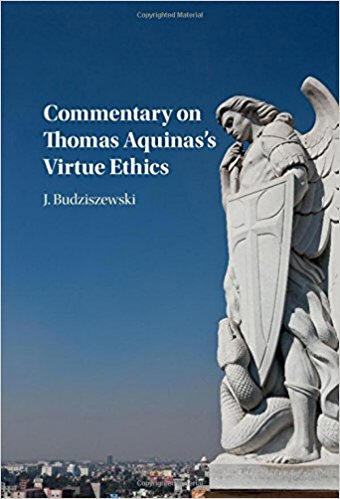Book Review
Commentary On Thomas Aquinas's Virtue Ethics
J. Budziszewski
Cambridge University Press (4 May 2017)
ISBN
978-1-107-16578-6
 This
volume is a commentary of selected texts from the theory of virtue in the
Summa Theologiae of Thomas Aquinas. Part 1 is about virtues in general and
part 2 is specifically on the virtue of justice.
This
volume is a commentary of selected texts from the theory of virtue in the
Summa Theologiae of Thomas Aquinas. Part 1 is about virtues in general and
part 2 is specifically on the virtue of justice.
In order to note the brilliance of this work, we will examine one of the questions discussed: whether virtue is suitably defined?
Virtue, says Thomas, is a good quality of the mind which enables us to live in an upright way. Thomas poses various objections: the first two objections protest calling virtue a good quality. The third protests calling it a quality of the mind. The fourth protests that it enables us to live rightly and the fifth protests that it cannot be employed badly. The sixth protests that God brings it about in us. The objector is arguing that a virtuous man is good, but goodness is not itself good. So virtue cannot be called good. Or, since it is possible to be proud of virtuous works, virtue can be put into bad use. To put it simply, Thomas poses so many excellent objections that one is tempted to go along with them.
Then we have the on the other hand. In this case, as in so many, there is a quote from Augustine to answer the question in the affirmative.
This is followed by replies to the objections. We learn that for Thomas, virtue is a habitus, The author is also contributing to the discussion with more contemporary reflections. For example, he notes that David Hume claims that reason is the slave of passions and can never pretend to any other office than to serve and obey them. But Hume is cheating because he labels all impulses affecting the will as passions and then claims only passions can affect the will.
The author also notes that a courageous bank robber is not exercising the virtue of fortitude because fortitude is grasping for what reasons something is to be done, and the bank robber lacks such wisdom. His rule is not the defense of true goods but simply getting what he wants.
There are many questions asked throughout this work that are relevant to contemporary ethics: whether the precepts of the decalogue are precepts of justice, whether we should always according to the written law, whether mercy is a virtue and whether moral virtues are connected to each other?
What is especially helpful is the author's many contemporary examples in order to help us understand more deeply.
All in all, another excellent work from the author showing the relevance of Thomas Aquinas for our age.
Reviewed by Dr Pravin Thevathasan
